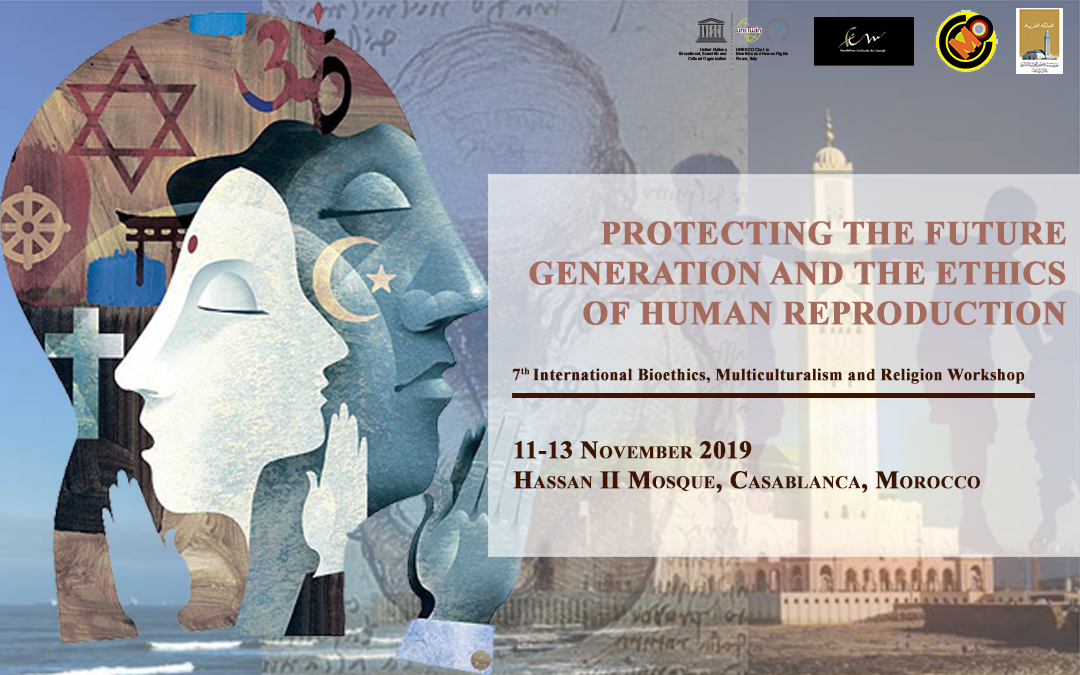Protecting the Future Generation and the Ethics of Human Reproduction
In this three-day event, the UNESCO Chair workshop, as part of the Bioethics, Multiculturalism, and Religion area of interest, will analyze and discuss “Protecting the Future Generations and the Ethics of Human Reproduction” from an Interreligious and Multicultural Perspective. Experts from religious (Buddhist, Christian, Confucian, Hindu, Islamic, Jewish) and secular traditions will discuss article 16 of the UNESCO Declaration on Bioethics and Human Rights: “The impact of life sciences on future generations, including on their genetic constitution should be given due regard.” Recent advances in reproductive technologies are having great impact on the creation of new families and affecting the roles of women.
We have chosen Morocco for these conferences because its prestigious higher education academic multicultural and diverse population making this location attractive for experts in the field. The topics to be addressed will capture the attention and interest of health professionals, university scholars, the scientific community, researchers, media, politicians and the general public.
We are confident that this next major UNESCO Chair endeavor gathering twenty-five experts in bioethics and other related disciplines from seven major cultural and religious perspectives will be help foster conversation and understanding among peoples from our globalized and religiously diverse world so in need of peace.
The methodology of the workshop is found here.
Key questions to be addressed by the papers
The framework of the workshop is based on Article 16 of the UNESCO Declaration on Bioethics and Human Rights: “The impact of life sciences on future generations, including on their genetic constitution should be given due regard.”
The ethics of artificial human reproduction (ART) is vast with many nuances and debates. While the papers could address areas in ART that are more particular to the religious tradition, we propose the papers to concentrate on the following guiding questions as they regard the more controversial areas that can affect the future generations and the nature of marriage, family and relationship with children.
On Pre-Natal Testing and Preimplantation Genetic Diagnosis
In the practice of IVF it is common for clinicians to perform prenatal testing (PNT) and preimplantation genetic diagnosis (PGD) as a means of selecting the genetically “healthier” embryos for in-utero implantation.
- Given the fact that neural tube disorders and genetic abnormalities can raise a host of spiritual and existential dilemmas, as well as explicitly ethical concerns, for the pregnant woman regarding her future child, to what extent should religious and spiritual and bioethical counseling be offered to women both during the process of obtaining consent for such testing, as well as during her deliberations regarding the results of such tests.
- Does PNT and PGD constitute a form of eugenics or is it an acceptable means of ensuring the health and flourishing of the future child/generation?
- Does PNT and PGD constitute of form of discrimination against future persons with genetic disabilities or lesser abilities because they are not enhanced?
- Does the act of genetically selecting embryos raise moral concerns regarding the relationship between generations?
On Maternal Surrogacy
- Is maternal surrogacy inherently a form of commodification for both the child as well as the mother, or can it be considered a virtuous (compassionate or selfless) act?
- How does the practice of maternal surrogacy affect the nature of motherhood, fatherhood, womanhood, childbearing and family?
- How does the practice of maternal surrogacy affect the future generation?
Enclosed are further details about a definitive schedule of these days.
Open to the Public Symposium
As means of dissemination, publicity and involvement of multiple and diverse scientific, medical and university communities and the public, we suggest holding in coordination with Fondation Cultures du Monde and the Association Fès Saiss an event open to the public on topics related to bioethics issues in the light of human rights in a multicultural and interreligious environment.
Artistic Event “Come To My Home”
During the days of the workshop and conference events the Moroccan Fondation des Cultures du Monde will organize an open to the public multicultural and interreligious artistic event: www.cometomyhome.ma
“Come To My Home” is a scientific, cultural and artistic endeavor, initiated by Mr. Driss Allaoui, former Secretary in Morocco and a prominent active figure in Moroccan society. Its mission is to mix and make interact art, cultures and different citizenships.
Participation
The workshop will be held in Casablanca, the precise location will be announced. Enclosed are further details about the Invited Presenters.
For those who would like to join us in this event, please contact us at info@unescobiochair.org for logistical details regarding hotel, meals, transport, etc. Expenses are not covered by our organization.
We are looking into possible cultural visits with a travel agency around the dates of the workshop.

